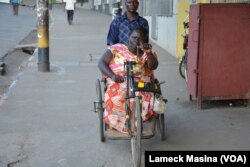Malawi’s government has called for the arrest of street beggars and parents of all children seen begging on the street. The government said most of the people on the street are begging as a profession, not a last resort. But the edict has sparked debate and police are yet to crack down.
It’s 6 o’clock in the morning. The streets in Malawi’s commercial capital, Blantyre, are bustling with people going to work.
Beggars on the sides of those streets ask for money.
Begging out of acute need
Many are disabled. Fifty-one-year-old Canforzi Biliati was born with deformed limbs. He said “this is the only way I earn a living. I give some money to my wife to help her business of selling fritters and I buy food and pay school fees for my children and pay for rent.”
Fanny Banda, a single mother of four, cannot walk. She must crawl or use a wheelchair. She said “we face a lot of abuses in the streets. Some people call us names while others scold at us saying, 'Why can’t we stay home and fend for ourselves?'"
Street begging in Malawi is punishable by a fine of about $2 or three months in jail.
The government called on police to begin enforcing that law in April, and to arrest adults who send children into the streets to beg.
“It [the law] also goes further to say anybody giving alms to beggars on the street, that person has broken the law and should also be arrested,” said Marry Shawa, is the principal secretary in the Ministry of Gender, Children, Disabilities and Social Welfare.
Shawa said the government did a study and found that only about 400 of the 4,500 people begging on the streets of Malawi’s two largest cities are begging out of an acute need.
Criminalizing giver and receiver
But religious leaders and advocates for the disabled say arrests are not the answer. The government should instead ensure access to education and employment.
Hilda Misomali, a hair dresser, said people should be free to give to beggars if they want.
“I think that’s not fair because others have just the heart to give. Others give them because may be they have a lot. The way the street children look sometimes forces one to give them, even if you didn’t want to give them,” she said.
But the government said having people, in particular children, milling the streets is dangerous. And that people can give to the needy at their homes or in other ways.
One month into the crackdown, police say they have yet to make any arrests. They are holding community meetings and trying to educate parents, religious leaders and shop owners.











